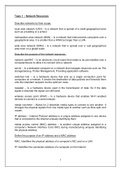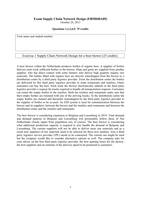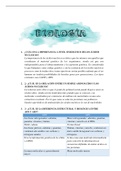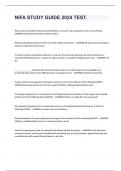,TOPIC 1: INTRO
Conceptualizing Administrative law
Hoexter regards administrative law as branch of public law which regulates the activities of the
bodies that exercise public power or perform public function. The CC has described administrative
law as an incident of the separation of powers under which the courts regulate and control the
exercise of public power by other branches of government.
Central Q: what is public power? – no single test of universal application.
- US and Canada have tended to associate public powers and functions with conduct and activities
which is governmental. SA has generally regarded this as irrelevent, however in Calibre Clinical
Consultants the court held that our courts have almost always sought features that are
governmental in kind. Some factors are the extent of state involvement and control or the
absence of the autonomy of state enterprise. Public funding.
- Duty to act in public interest or pursuant or in pursuance of a public duty rather than a private
purpose
- Source of power, power exercised consensually or coercively and its effect on the public
Admin law overlaps with constitutional law to a considerable extent, which is also concerned with
the organs of state and their interaction with citizens. The departure comes with admin emphasizing
one particular branch of the state system, the public admin ad particularly activity of the state. This
type of action has been described by the SCA as ‘the conduct of bureaucracy in carrying out the daily
functions of the state which necessarily involves the application of policy, usually after its
translations into law, with direct and immediate consequences for individuals or groups.
By contrast public administration is more technical and is generally to mean the organs and
functionaries of the executive branch and the day to day business of implementing law and
administering policy. This term does not extend to government administrations, regulatory boards or
quasi-governmental organizations (Eskom, Telkom).
However, in the new democratic era the shift has turned from the functionary to function. For
instance, actions performed by private entities are also capable of qualifying as admin action
provided that those actions have a public character
Admin law can be divided into sectoral and general admin law which expound the rules and
principles common to most kinds of administrative action. The machinery of admin law consists of
the constitutional rights and PAJA. These provide for a means to challenge maladministration by way
of judicial review. Judicial review should not be conflated with admin law, the former is concerned
with the judicial detection and correctio of maladministration. The latter is concerned with non-
judicial as well as judicial safeguards against poor decision making. Furthermore, judicial review
focuses on the diagnosis of what went wrong, admin law is more positive in the sense that it also
empowers administrators.
Hoexter comments of the domain pf administrative law. The reason for the cast spread in admin law
is the growth in power and influence in state activities. State public power is not merely exercised
for internal order and defense against external threats, but to also engage in measures designed to
achieve distributive justice. In a post-apartheid context, the government’s commitment to a
reformation involves a greater degree of regulation. Constitutionally speaking, government cannot
be released from its obligations simply because it employs a strategy of delegation’. However, at the
same time the constitutional recognition and profusion pf rights means that there is less work for
review than the past.
,Development of administrative law
Prior to the constitution judicial review was the primary and almost only significant control on the
use of admin power. The chief alternative of appeals was not respected for its indepedence or its
rationality. And the only safeguards were an auditor general and an advocate general. A far more
reliable form of redress was judicial review, where the SCA used its inherent power to test delegated
legislation and the administrative decisions on grounds established by common law. In view of this
inherent jurisdiction, a body of principles emerged which came to be known as admin. Hoexter notes
that admin law in this era must be viewed in light of the doctrine of parliamentary sovereignty,
which served as a fundamental constraint on the development of admin law. While the courts had
the power to review the legality of administrative conduct, parliament was free to decide what
counted as lawful and what did not. Often the will of courts to fault the excurse of power was
absent.
Now the constitution has revolutionized admin law and the concept of admin justice. BOR provisions
which are significant to admin law:
- The power of the courts is no longer grounded in the common law and subservient to authority,
the constitution is supreme
- S34 which confers the right to have disputes settled by a court or independent tribunal
- S32 right of access to information held by the government
- S38 which empowers the courts to grant appropriate relief
- S33 right to just admin action. The rights entrenched apply to all law and bind all organs of state,
require 2/3 majority to amend and may be limited only in terms of s36.
- S1 values inform the interpretation and set standards – accountability, responsiveness and
openness.
- S195 which sets out the basic values and principles governing public administration. The
constitution itself also establishes a public service commission to promote these values and
principles in the public service – e.g. impartiality, responsiveness, public participation and
transparency. The CC has frequently held that administrators conduct themselves in accordance
with the values of 195
- Ch9 which establishes state institutions supporting democracy – Public Protector and Auditor
general which serve to safeguard the admin system.
- Culture of justification – taking consideration of the constitutional as a whole
- Admin law today is both wider and deeper, although judicial review remains paramount.
CORDER
Corder says that an effective admin system is crucial to the rule of law, and thus to the
transformative nature of constitutional democracy. Mureinik holds that we must move from a
culture of authority to a culture of justification. Administrative law is ultimately all about a quest for
balancing rights, interests and obligations in the determination of which public and legal policy play a
central role.
Administrative law is that part of constitutional law which empowers those exercising public
authority or performing public functions through the law, and which holds accountable to the rules
of law all those who exercise public power or perform public functions.
, Admin law deals with two sides of public power – its authorization and its regulation. These are
often described as accountability and empowerment elements. (greater emphasis on the latter in a
constitutional democracy).
Ultimately, the guarantee of effectiveness of admin law lies with the freedom of every citizen to
freely and fairly vote for the representative law making institution, and the role of the legislature as
a watchdog. Parliament holds ministers accountable by asking questions about decisions made in
the state dept, scrutiny of the state performance ad budget standing through portfolio committees,
by critical evaluation of the annual budget vote, through the audit general. In addition, the media
plays a role which investigates and publicizes unfair admin action.
Rule of law overlaps extensively with administrative law in that no public power may be exercised
without lawful grant and in an acceptably lawful manner (ultra vires principle)
Corder acknowledges the view of the past –Affords a better understanding/ to avoid repetition of
past errors. He addresses this through six considerations.
1) Consequences of judge made law – Common-law/judge made law influenced the pace and
development due to the excessive reliance of judicial review which was grounded in.
inherent jurisdiction of the SCA. Its exercise meant that judicial policy has shifted between
concern for the individual and ‘executive mindless’. Secondly, the doctrine of the separation
of powers requires a degree of separation of both personnel and functions between the
branches of government, a system of mutual checking and balancing of the exercise of
governmental power. Under apartheid – parliamentary sovereignty blurred this. The
judiciary was formally independent, although the executive had power of appointment.
2) The shifting lines between the private and the public sphere-. In light of certain
considerations (population, decline in free market, basic employment standards, global wars
and disease), a demand arose for government to step up and provide goods and services in
the 1900’s. In addition, the aftermath of the wars resulted din a subscription to minimum
standards and recognition of human rights. In some instances, south Africa went further
through insurance company and steel processing plants. We mirrored the trend of the world
– however with one critical difference, the favoring of those classified as ‘white’.
3) Discretionary authority: In SA wide discretion was given for racial classification and conduct
of the state in detaining government opponents.
4) Distinction between executive and administrative authority – What was seen as judicially
reviewable before 1994 was classified according to the doctrine of classification of functions
of administrative action (law making, judicial. Quash-judicial purely admin, ministerial
nature). The hierarchal nature of the list assisted the judge in determining the appropriate
level of deference to display in his/her judgment. This classification provided a useful tool for
judges to determine their approach, provided that it continued to facilitate administrative
accountability other than as an end I itself. In reality, much of the jurisprudence regarding
reviewability has been done on a case-by case basis exploration of the appropriate limits to
review. As seen, there is no to executive power due to it being regarded as a broader
notation that public administration, characterized by a high level of discretion. However,
post-1994 the exercise of such authority is not above the law. A parallel track of supplied by
s1(c) of the constitution has developed the principle of legality as a basis for review.
5) Distinguishing between review and appeal – Review is limited to procedural irregularity and
does not hear appeals on the merits of such actions. This distinction is sometimes difficult to
draw, especially through s33 which prescribes reasonable admin action. Review for
reasonableness applies naturally to the process of taking the action, but also necessitates a
degree of consideration of facts. Such cases must be handled with caution, respect and
wisdom.
6) Damaging effect of apartheid – racial classification lead to the escapement of tribunals to
hear appeals from such decisions on the facts. The existence of a degree of official discretion










